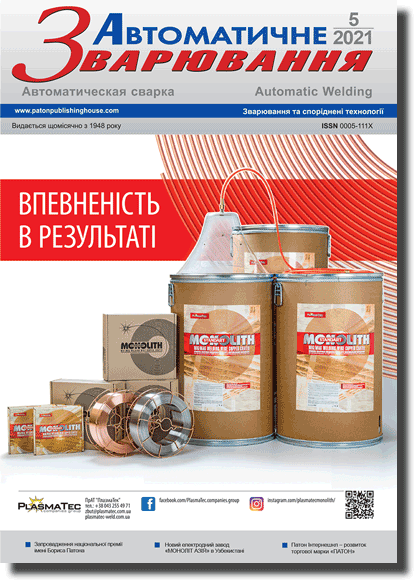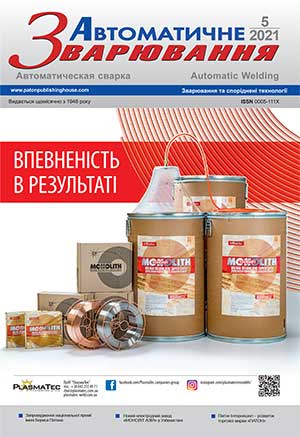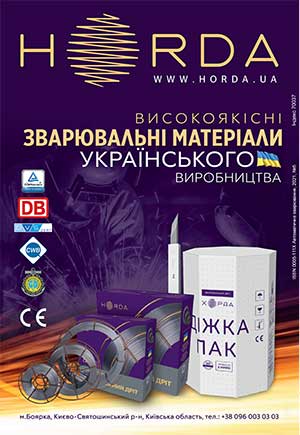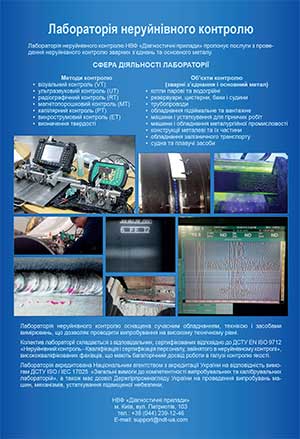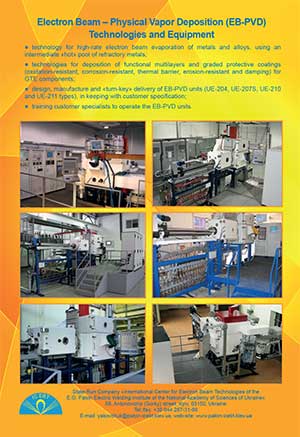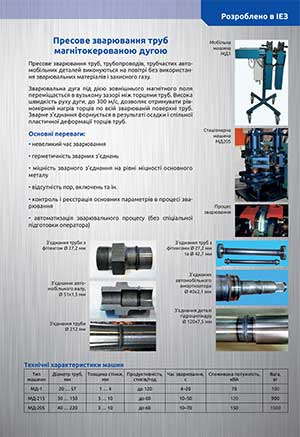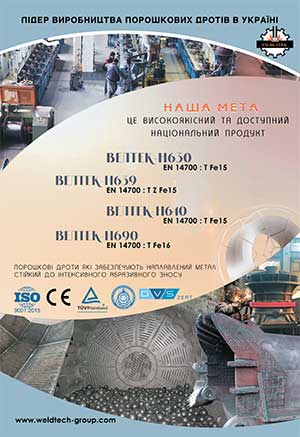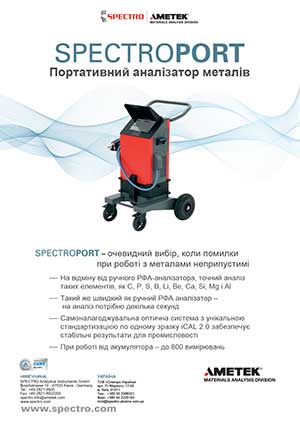| 2021 №05 (02) |
DOI of Article 10.37434/as2021.05.03 |
2021 №05 (04) |
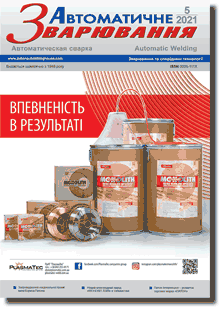
"Avtomatychne Zvaryuvannya" (Automatic Welding), #5, 2021, pp. 21-27
Improving the efficiency of the SLM-process by adjusting the focal spot diameter of the laser beam
S.V. Adjamskiy1, G.A. Kononenko2, R.V. Podolskyi2
1LLC «Additive Laser Technology of Ukraine». 144 Rybinska Str., 49000, Dnipro, Ukraine. E-mail: info@alt-print.com
2Institute of Ferrous Metallurgy. Z.I. Nekrasova National Academy of Sciences of Ukraine. 1 Academician Starodubov Sq., 49000, Dnipro, Ukraine. E-mail: office.isi@nas.gov.ua
Selective laser melting (SLM) is one of the modern methods of additive manufacturing, which allows creating high-density parts with unique geometry from metal powder. To increase the efficiency of the SLM process, it is desirable to increase the width of the melt pool, as this will increase the distance between the laser passes and a larger volume will be built in a shorter period of time. However, the formation of the outer surface of large tracks will increase its roughness, which can significantly reduce the overall reliability of a product. To improve the surface quality, it is necessary to reduce the size of the melt pools, for example, by reducing the diameter of the focal spot of the laser. The specimens made at different focal spot diameters using the same laser power were examined. Based on the results of the analysis of technological parameters of the process it was established that to increase the efficiency of SLM-process the printing of the main body of a product can be performed at an increased focal spot diameter, and to provide a high surface quality. According to the redistribution of energy along the crosssection of the beam, a change in the configuration of the melt pool, and accordingly the track occurs. It was established that in order to avoid the formation of deep remelting due to a high concentration of energy in the center of the beam, it is necessary to reduce the laser power. 29 Ref., 6 Fig.
Keywords: selective laser melting, technological factors, quality system, AISI 316L, specific linear energy
Received:14.04.2021
References
1. Frazier, W.E. (2014) Metal additive manufacturing: a review. Journal of Materials Engineering and performance, 23, 6, 1917-1928. https://doi.org/10.1007/s11665-014-0958-z2. Huang, R. et al. (2016) Energy and emissions saving potential of additive manufacturing: the case of lightweight aircraft components. Journal of Cleaner Production, 135, 1559-1570. https://doi.org/10.1016/j.jclepro.2015.04.109
3. Ford, S., Despeisse, M. (2016) Additive manufacturing and sustainability: an exploratory study of the advantages and challenges. Journal of cleaner Production, 137, 1573-1587. https://doi.org/10.1016/j.jclepro.2016.04.150
4. Conner, B.P., Manogharan, G.P., Martof, A.N. et al. (2014) Making sense of 3-D printing; creating a map of additive manufacturing products and services, Additive Manufacturing, 1-4, 64-74. https://doi.org/10.1016/j.addma.2014.08.005
5. Liverani, E. et al. (2017) Effect of selective laser melting (SLM) process parameters on microstructure and mechanical properties of 316L austenitic stainless steel. Journal of Materials Processing Technology, 249, 255-263. https://doi.org/10.1016/j.jmatprotec.2017.05.042
6. Yadroitsev, I. et al. (2013) Energy input effect on morphology and microstructure of selective laser melting single track from metallic powder. Journal of Materials Processing Technology, 213, 4, 606-613. https://doi.org/10.1016/j.jmatprotec.2012.11.014
7. Yadollahi, A. et al. (2015) Effects of process time interval and heat treatment on the mechanical and microstructural properties of direct laser deposited 316L stainless steel. Materials Science and Engineering: A., 644, 171-183. https://doi.org/10.1016/j.msea.2015.07.056
8. Kamath, C. (2016) Data mining and statistical inference in selective laser melting. Int. J. Adv. Manuf Technol., 86, 1659-1677. https://doi.org/10.1007/s00170-015-8289-2
9. Sames, W.J., List, F., Pannala, S. et al. (2016) The metallurgy and processing science of metal additive manufacturing. Int. Mater. Rev., 61, 315-360. https://doi.org/10.1080/09506608.2015.1116649
10. Kempen, K., Thijs, L., Yasa, E. et al. (2011) Process optimization and microstructural analysis for selective laser melting of AlSi10Mg. Solid Freeform Fabrication Symposium, 22, 484-495.
11. Kamath, C., Eldasher, B., Gallegos, G.F. et al. (2014) Density of additively-manufactured, 316L SS parts using laser powder-bed fusion at powers up to 400 W. Int. J. Adv. Manuf Technol, 74, 65-78. https://doi.org/10.1007/s00170-014-5954-9
12. Amato, K.N., Gaytan, S.M., Murr, L.E. et al. (2012) Microstructures and mechanical behavior of Inconel 718 fabricated by selective laser melting. Acta Mater., 60, 2229- 2239. https://doi.org/10.1016/j.actamat.2011.12.032
13. Adzhamskyi, S.V., Kononenko, A.A., Podolskyi, R.V. (2020) 2D modeling of nonstationary temperature field of simple track of heat-resistant alloy Inconel 718. In: Proc. of All-Ukrainian Scientific-Methodical Conf. on Problems of Mathematical Modeling, 1, 42-45 [in Ukrainian]. https://www.d https://www.dstu.dp.ua/uni/downloads/material_konf_traven_%202020.pdf.
14. Khorasani, A., Gibson, I., Kozhuthala, J. Veetil, Ghasemi, A.H. (2020). A review of technological improvements in laser-based powder bed fusion of metal printers. Int. J. Adv. Manuf Technol. 2020. Vol. 108. Р. 191-209. https://doi.org/10.1007/s00170-020-05361-3
15. SLM Solutions (2019) SLM MACHINES. Last modified March 20, 2019, accessed March 21, 2019. https://slmsolutions.com/products/machines
16. Akbari, M., Kovacevic, R. (2019) Closed loop control of melt pool width in robotized laser powder-directed energy deposition process. Int. J. Adv. Manuf Technol., 1-12. https://doi.org/10.1007/s00170-019-04195-y
17. Shrestha, R., Shamsaei, N., Seifi, M., Phan, N. (2019) An investigation into specimen property to part performance relationships for laser beam powder bed fusion additive manufacturing. Addit Manuf, 29, 100807. https://doi.org/10.1016/j.addma.2019.100807
18. Urhal, P., Weightman, A., Diver, C., Bartolo, P. (2019) Robot assisted additive manufacturing: a review. Robot Comput Integr Manuf, 59, 335-345. https://doi.org/10.1016/j.rcim.2019.05.005
19. SISMA (2019) LMF «laser metal fusion» technology, last modified March 20, 2019, accessed March 21, 2019. https:// www.sisma.com/en/additive-manufacturing/
20. Jafari, R. et. al. (2019) Recent progress and challenges with 3D printing of patterned hydrophobic and superhydrophobic surfaces. Int. J. Adv. Manuf Technol., 1-14. https://doi.org/10.1007/s00170-019-03630-4
21. Rausch, A.M., Markl, M., Körner, C. (2019) Predictive simulation of process windows for powder bed fusion additive manufacturing: influence of the powder size distribution. Comput Math Appl, 78(7), 2351-2359. https://doi.org/10.1016/j.camwa.2018.06.029
22. Renishaw (2019) Additive manufacturing products, last modified March 20, 2019. https://www.renishaw.com/en/ additivemanufacturing-products%2D%2D17475. Accessed March 21, 2019.
23. Yeung, H., Lane, B., Fox, J. (2019) Part geometry and conduction based laser power control for powder bed fusion additive manufacturing. Addit Manuf 30:100844. https://doi.org/10.1016/j.addma.2019.100844
24. Adjamskyi, S.V., Kononenko, G.A., Podolskyi, R.V. (2020) Influence of technological parameters of SLM-process on porosity of metal products. The Paton Welding J., 10, 13-18. DOI: https://doi.org/10.37434/as2020.10.03 https://doi.org/10.37434/as2020.10.03
25. Adjamskyi, S.V., Kononenko, G.A., Podolskyi, R.V. (2020) Simulation of influence of residual stresses and parameters of SLM technology on formation of boundary areas of heatresistant alloy Inconel 718 products. In: Proc. of Sci. and Tech. Conf. on Information Technology in Metallurgy and Machine Engineering (17-19 March 2020, Dnepr). Dnepr, 4-6 [in Russian]. https://doi.org/10.34185/1991-7848.itmm.2020.01.001
26. Adjamskyi, S.V., Kononenko, G.A., Podolskyi, R.V. (2020) Investigation of influence of SLM-process modes on quality in contour area of products. In: Proc. of Int. Conf. on University Science-2020, 1, 157-158. http://eir.pstu.edu/bitstream/handle/123456789/17421/%D0%A3_%D0%BA%D0%B0%D1%8F%20%D0%BD%D0%B0%D1%83%D0%BA%D0%B0_2020_%D0%A2_1.pdf
27. Rosenthal, D. (1941) Mathematical theory of heat distribution during welding and cutting. Weld J., 20(5), 220-34.
28. Du, Y., You, X., Qiao, F. et al. (2018) A Model for Predicting the Temperature Fieldduring Selective
29. Promoppatum P., Shi-Ch Yao, Pistorius P.C., Rollett A. (2017). A Comprehensive Comparison of the Analytical and Numerical Prediction of the Thermal History and Solidification Microstructure of Inconel 718 Products Made by Laser Powder-Bed Fusion. Engineering, 3, 685-694. https://doi.org/10.1016/J.ENG.2017.05.023
Advertising in this issue:
The cost of subscription/purchase order journals or individual articles
| Journal/Currency | Annual Set | 1 issue printed |
1 issue |
one article |
| TPWJ/USD | 384 $ | 32 $ | 26 $ | 13 $ |
| TPWJ/EUR | 348 € | 29 € | 24 € | 12 € |
| TPWJ/UAH | 7200 UAH | 600 UAH | 600 UAH | 280 UAH |
| AS/UAH | 1800 UAH | 300 UAH | 300 UAH | 150 UAH |
| AS/USD | 192 $ | 32 $ | 26 $ | 13 $ |
| AS/EUR | 180 € | 30 € | 25 € | 12 € |
| SEM/UAH | 1200 UAH | 300 UAH | 300 UAH | 150 UAH |
| SEM/USD | 128 $ | 32 $ | 26 $ | 13 $ |
| SEM/EUR | 120 € | 30 € | 25 € | 12 € |
| TDNK/UAH | 1200 UAH | 300 UAH | 300 UAH | 150 UAH |
| TDNK/USD | 128 $ | 32 $ | 26 $ | 13 $ |
| TDNK/EUR | 120 € | 30 € | 25 € | 15 € |
AS = «Automatic Welding» - 6 issues per year;
TPWJ = «PATON WELDING JOURNAL» - 12 issues per year;
SEM = «Electrometallurgy Today» - 4 issues per year;
TDNK = «Technical Diagnostics and Non-Destructive Testing» - 4 issues per year.




